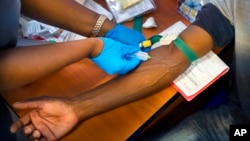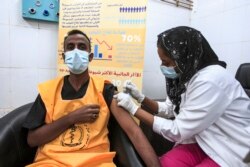Some Africans are avoiding COVID-19 vaccines because they are concerned about safety.
This has worried international public health officials as some countries have begun to destroy doses that expired before they could be used.
Malawi and South Sudan in recent days have said they will destroy some of their doses because they had expired.
Africa’s 1.3 billion people represent 16 percent of the world’s population. But, the World Health Organization reports that Africa has received less than 2 percent of the world’s COVID-19 vaccine doses.
African countries have confirmed more than 4.5 million COVID-19 cases, including 120,000 deaths. That is a very small percentage of the world’s deaths.
Some experts, however, worry that Africa’s 54 nations will suffer in the long term if it takes longer than expected to get to 70 percent immunity. That is the number needed to stop the uncontrolled spread of the virus. Immunity can be gotten through vaccination or past infection.
African nations are hoping to vaccinate up to 60 percent of their people by the end of 2022.
That target will require about 1.5 billion vaccine doses for Africa if the two-injection AstraZeneca vaccine continues to be widely used. It is the main vaccine used by the COVAX program for developing countries.
Safety concerns about that vaccine have left some Africans worried. Untrue vaccination-related stories have spread widely on social media. They might be the result of a common lack of trust in government and officials.
Uganda’s health minister was forced to deal with untrue stories that she had faked her vaccination. “Please stop spreading fake news!” she wrote on Twitter, along with a photo of her receiving the injection.
Other untrue stories include a claim that the vaccine can cause infertility or that it was created too quickly to be real.
“The world has failed to find a vaccine for AIDS all these years, but they quickly found a vaccine for COVID? I am not going to go for that vaccine,” said Richard Bbale. He is an electrician in the Ugandan capital, Kampala.
The World Health Organization and the Africa Centers for Disease Control and Prevention have urged African governments to continue giving out the AstraZeneca vaccine. They say people in African countries should not be concerned about reports of rare blood clots in a few people who have gotten the vaccine.
“Anything you take has a risk. Any medication,” Africa CDC director John Nkengasong said last week. “That’s the way we should be looking at these vaccines,” he added.
The Africa CDC said recently that it had received information from the Serum Institute of India that vaccines set to expire on April 13 could be good for another three months.
Africa nations “don’t have a choice,” Nkengasong said, urging Malawi not to destroy 16,000 AstraZeneca doses that expired earlier in April.
It is unclear if Malawi will accept the advice.
The country has administered less than 50 percent of more than 500,000 doses it received from the COVAX program.
An additional 1.26 million doses expected from COVAX at the end of May could go unused if people continue to avoid the vaccine, said Shouts Simeza. He is president of the National Organization of Nurses and Midwives in Malawi. He said making the vaccine required by law may solve the problem.
In an effort to reach more people, Malawi has just made the vaccine available to anyone over 18.
Uganda’s ministry of health may soon take steps to increase vaccination. Uganda has received 964,000 doses of the AstraZeneca vaccine, the only one available in the country. Only 230,000 doses have been used since March 10.
The government is now asking famous television actors and athletes to get their vaccinations publicly to show its safety.
Acceptance “is gradually improving,” a spokesperson said.
The local Daily Monitor newspaper recently reported that more than 280,000 doses will likely expire by July. That is because the current rate of vaccinations is about 6,000 shots each day.
I’m Susan Shand.
The Associated Press reported this story. Susan Shand adapted it for Learning English. Mario Ritter, Jr. was the editor.
____________________________________________________________
Words in This Story
expire – v. to no longer be usable or good after a period of time
dose – n. the amount of a medicine, drug or vitamin this is taken at one time
immunity – adj. the power to keep yourself from being affected by a disease
clot – n. (medical) a mass of dried blood that stops blood from flowing through blood vessels
We want to hear from you. Write to us in the Comments Section, and visit our Facebook page.






